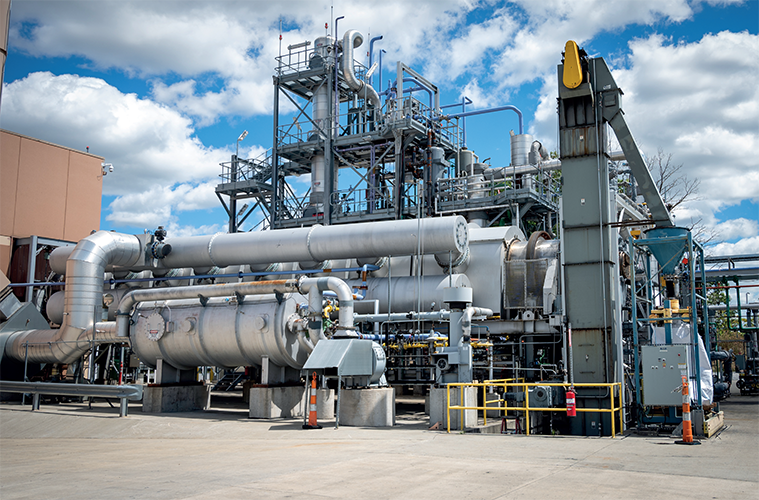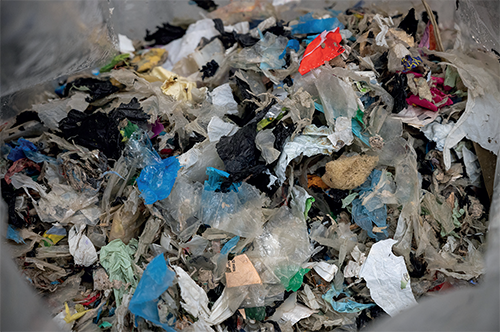
Alterra Energy
When the going gets green
Alterra Energy (Alterra) crafted its mission ‘solving plastic pollution’ with the goal of helping create a cleaner planet. “As human beings, we need to do a better job at taking care of the world,” shares Frederic Schmuck, CEO of the Ohio-based business.
Specializing in developing the technology that allows for a wide range of plastic waste streams from end-of-life sources to be liquefied into a material similar to crude oil, Alterra creates high-quality feedstock for polymers and chemical production.
Schmuck has overseen impressive growth at the company and shares with us how Alterra is challenging itself to be part of the solution for a greener globe: “Advanced recycling is here to stay. Our mission is to globalize the technology. As emerging markets continue to mature – and very quickly follow the EU and the US in recycling objectives – our process will help create greater value for plastic waste, which leads to greater value for our customers, ultimately solving plastic pollution,” he states.
Recently, Alterra welcomed Neste (the world’s leading provider of renewable diesel and sustainable aviation fuel), to join its team with a minority stake. The collaboration between the companies includes joint development and global licensing, enabling the partners to commercialize Alterra’s proprietary thermochemical liquefaction technology across Europe and beyond. With this, the two companies hope to accelerate the adoption of advanced recycling practices – and encourage other market players to implement Alterra’s technology, turning end-of-life and hard-to-treat plastic waste into versatile polymers and chemicals (replacing virgin oil as raw material).
Alterra’s innovation is showcased at the company’s industrial-scale liquefaction plant in Akron, Ohio. “Over the years, we have developed cutting-edge intellectual property as well as dozens of trade secrets that are critical to liquefaction. As a result, our Akron facility is able to create economic value from waste plastics, effectively transforming them into petrochemical material,” Schmuck shares.
Since its inception in 2009, Alterra’s aim was always creating a cleaner planet. Over time, that meant adapting to the trends in the market.
Today, three key factors shape Alterra’s strategy. “First, the exciting reality that recycling is finally being prioritized by many businesses – and recycling technology innovation has matured enough to support the change,” says Schmuck. “Next, our customers are embracing advanced recycling as a way to complement their raw material for product manufacturing. This means they are installing the necessary refining operations into their facilities to support the processes that liquefies waste plastic into their raw material. Finally, there has been a massive uptick in consumer demand for more recycled content, which encourages the market to respond accordingly,” Schmuck concludes.
All of this is creating an opportunity for Alterra to support the industry – and to ensure that advanced recycling grows rapidly for the next few decades. “There is great momentum for us to continue to improve what we are already working on,” says Schmuck. “We are enhancing the lifecycle of the technology while strengthening Alterra from a start-up to an enterprise that can support an economically viable solution for all our partners.”
But Alterra’s market advantages don’t end there. “There is this idea that, because waste is plentiful, it’s also centralized. But waste needs to be aggregated for the process to be economical – and we are integrating with upstream partners to offer our customers a seamless solution,” Schmuck reveals.
Another key factor? Alterra’s process is truly constant. “We continuously feed in waste plastic and produce pyrolysis oil and circular carbon. We don’t batch or continuous batch. Plus, our process and equipment enable us to process a wide variety of different waste plastic types. The Akron site, for example, can process 60 tons of waste plastic per day, which produces roughly 300 barrels of product within the same time frame. While this is a commercial scale plant, we are currently designing and implementing facilities two-to-three times the size of our Akron plant for multiple customers.”
Of course, as with any first-to-market process, there are considerations. “We have to make sure that our process is robust – and that we can  meet the product specification requirements of our customers. For instance, contaminants embedded in plastic waste are different than those contained in naturally occurring crude oil. Therefore, the downstream refining operations must be taken into account. That said, this complexity is what motivated us to ensure that our operation is incredibly thorough. I think, more than anything, this speaks to the agility of our team to respond quickly to challenges,” Schmuck explains.
meet the product specification requirements of our customers. For instance, contaminants embedded in plastic waste are different than those contained in naturally occurring crude oil. Therefore, the downstream refining operations must be taken into account. That said, this complexity is what motivated us to ensure that our operation is incredibly thorough. I think, more than anything, this speaks to the agility of our team to respond quickly to challenges,” Schmuck explains.
It’s this level of engagement and commitment to detail that enabled the company to maintain its footing during the instability of the Covid- 19 crisis. While many businesses are still experiencing difficulties in the aftermath of the pandemic (especially in terms of supply chains and labor), Alterra continues to grow in these unprecedented times, thanks to strategic thinking.
“If you look at what happened over the last 12-to-15 months, there were disruptions in many segments, particularly transportation. Even under normal circumstances, it’s expensive to transport waste,” says Schmuck. “So being able to package the waste stream – and having a location close to the source – is very beneficial. We are looking to locate new facilities based on the optimization that can be derived from the front-end logistics of aggregating and preparing the waste feedstock and where our end-product needs to be refined. We believe in more modular solutions that are repeatable and decentralized across geographical areas, rather than having a few mega-sized production units, which are more challenging to operate efficiently,” explains Schmuck.
What’s next for Alterra? When asked what he envisions for the business in the next five years, Schmuck shares that there are exciting developments happening – and that he’s looking forward to the rapid progress these will bring.
“I am not sure five years will be enough for all the plans we have, but one thing is certain – we cannot do any of this without the people who make up our team. We have doubled the organization in the last year, we are going to double again next year. Our experts have extensive experience across this industry plus an entrepreneurial spirit. We have a culture of dedication and passion,” Schmuck expresses.
As our discussion draws to a close, Schmuck reflects on the noticeable change in industry perceptions. “So many people are now interested in the potential that advanced recycling has to offer. We have key talent coming to us from the major petrochemical and chemical companies. They are excited about the process and motivated to make a difference. Yes, when you look at the volume that refineries across the world are producing, what we’re doing is going to remain a blended practice for the foreseeable future but there is hope,” he opines.
As it steps toward globalizing its technology, the company is working closely with the American Chemistry Council, where Alterra will showcase its technology and continue to position itself to support the bigger picture.
“The world is still a long way away from eradicating plastic pollution. However, until that day comes, Alterra will remain a leader in developing continuous recycling technology, helping to create a greener, safer planet for generations to come,” Schmuck concludes.
Alterra Energy
www.alterraenergy.com
Services: Continuous recycling technologists